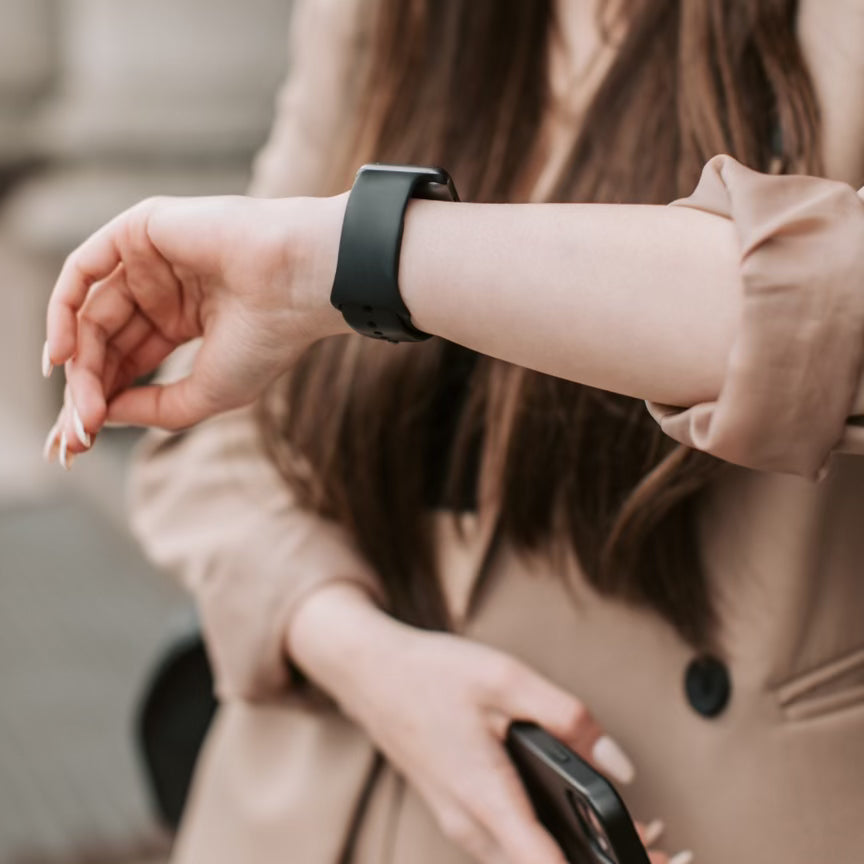My watch indicated that I was experiencing stress, even before I realised it myself. Does that resonate with you? If you wear a fitness tracker, smartwatch, or ring that nudges you to breathe, move, or meditate, you are participating in an exciting transformation in health technology. For women, this journey often involves navigating a complex relationship with their bodies and the devices designed to offer support and guidance.
But what are these devices doing? And how do they make us feel?
The Science of Stress, Now on Your Wrist
According to a 2023 review on wearables for stress management, more than 60% of research studies found significant reductions in stress among users of wearable devices. Smartwatches and bands, especially those equipped with sensors that measure heart rate variability (HRV), galvanic skin response (how emotional a person is), and even temperature, have emerged as powerful tools for real-time stress detection and response.
These devices do more than simply monitor stress, they actively help you manage it. Some give you a gentle vibration as a subtle cue to pause and breathe. Others guide you through calming techniques, such as resonance breathing, using mindfulness exercises. Many harness machine learning to tailor their responses, detecting when you might need a break, even before you consciously realise it.
Sounds helpful, right? It often is, but the story doesn’t end there.
A Mirror to My Nervous System
In a separate review focused on women’s experiences with wearable self-tracking, users described their devices as both empowering and, at times, emotionally demanding. Women often felt more connected to their bodies, gaining insights into energy levels, mood and triggers they previously ignored or couldn’t articulate.
One user described how her wearable helped her “listen” to her body more attentively. For many, the act of self-tracking offered agency, a way to reclaim understanding in a health system that sometimes leaves women feeling dismissed or misunderstood.
But there’s a flip side. Beyond the potential risks related to data security, privacy, and the accuracy of collected information, the emotional labour of constantly monitoring and managing oneself may have negative mental health impacts, such as heightened anxiety. Constantly focusing on our health status isn’t necessarily a positive habit; in fact, some doctors are concerned it could lead to an increase in health anxiety and hypochondria (chronic anxiety about one's health), ultimately raising stress levels.
Let’s be honest, we already juggle a never-ending to-do list, trying to eat well, stay active and keep a calm mind. Now imagine adding another voice, this time from your wrist, reminding you that you’ve missed your “recovery score” or didn’t get enough sleep.
So, what should we actually do with all this data?
As women, the rise of wearable health technology offers powerful insights into our bodies from tracking sleep, cycle phases and heart rate variability to monitoring stress levels and daily activity. This data can be incredibly useful in helping us understand our unique rhythms and make more informed decisions about our wellbeing.
However, while wearables can guide and support us, they shouldn't replace our own intuition or become a crutch. The goal is to use this information as a tool, not to create a dependency. Long-term health and balance come from tuning into our bodies, making sustainable lifestyle changes and cultivating habits that support physical, mental and emotional wellness without needing constant digital validation. It's about learning to trust ourselves again, using tech to empower not override our inner intuition.
Your data is powerful. But your story is what matters.
Written by:
Agora Health Team
Sources:
Del Busso, L., Brottveit, G., Torp Løkkeberg, S., Gluppe, G., 2022. Women’s embodied experiences of using wearable digital self-tracking health technology: A review of the qualitative research literature. Health Care for Women International 43, 1355–1379. https://doi.org/10.1080/07399332.2021.1884682
González Ramírez, M.L., García Vázquez, J.P., Rodríguez, M.D., Padilla-López, L.A., Galindo-Aldana, G.M., Cuevas-González, D., 2023. Wearables for Stress Management: A Scoping Review. Healthcare 11, 2369. https://doi.org/10.3390/healthcare11172369






